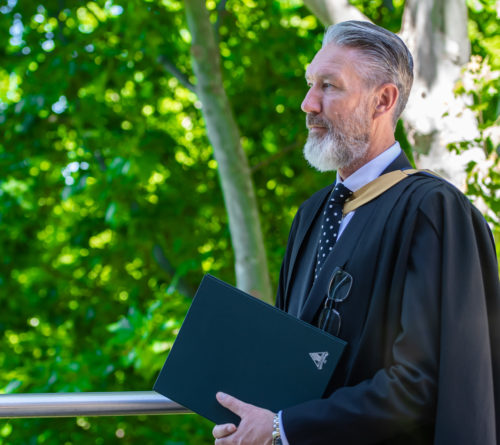From the Deputy Head Master – Summer Hill
Since the foundation of Trinity Grammar School, Chapel services have been an integral part of our community. “What does a chapel mean to a Church School?” This was the rhetorical question that introduced The Chapel Within Trinity Grammar School, a brief account by former Head Master, Mr Wilson Hogg and former School Captain, Old Trinitarians’ Union President and Member of the School Council, Mr Kerrigan, written and published in the 1960s. Their answer: that the building was “the embodiment of the Christian principles upon which (the School) was founded”. Their account continues with the exhortation that “we must never forget that the Chapel is a memorial … to the memory of Trinitarians who served and those who died” in the service of their country. The foundation stone was laid on 11 November 1956. Remembrance Day. The War Memorial Chapel was opened and dedicated one year later. On both occasions there was a “solemn reading of names of those who had given their lives and whose names were inscribed on a bronze plate above the north-east door, and “in the shadow of the national flag”. After an extended, Covid-19 imposed hiatus, it has been lovely to be able to resume services in the Memorial Chapel this term. Of all the events and activities that were curtailed over the last two years, the joining together in Houses for a period of corporate worship was perhaps the most significant. It was the hope of Messrs Wilson Hogg and Kerrigan, that the Memorial Chapel would provide for the boys and Old Boys of Trinity Grammar School a symbol and reminder of the deepest meaning and purpose of their School, and an oasis of quiet reflection in the otherwise vibrant and lively life of the School.
In Senior School Assembly this week, Dr De Lany spoke to your sons about the value of feedback and having a growth mindset. In simple terms, a fixed mindset is holding the belief that ability, talent and intellect are, as the term suggests, fixed. So, a person with a fixed mindset tends to say things like: “I am either good at something, or I am not”, “I don’t like to be challenged because my potential is predetermined”, “I don’t like criticism or feedback because it makes me feel that I am not very good”, or “failure is bad”. A growth mindset, on the other hand, takes the opposite view. That ability, talent and academic ability is not fixed. The self-talk of a person with a growth mindset is likely to be: “challenges help me grow”, “feedback is constructive and helps me improve,” “failure is an opportunity to learn and grow” and “effort and attitude are the most likely predictors of success”. This suggests that when people hit roadblocks dealing with difficult challenges and problems that, their inner voice says either, “I am not smart enough to solve the problem” (a fixed mindset) or “I have not been able to solve the problem, yet” (a growth mindset). At Trinity, we are constantly encouraging your sons to approach all aspects of their School life with a growth mindset. Whether it is sport, co-curricular activities or academic challenges, there is efficacy in believing in the power of the word, “yet”.
In the past I have regularly shared an anecdote about a former student from 2010, “James”, who taught me a valuable lesson about growth, the value of process, and that a high IQ was not the most significant factor in academic achievement, and Dr De Lany’s occasional remarks reminded me of him, and the School’s thesis is that all students can grow, and all students can achieve. That the best predictive factor is engagement in the process. Therefore, the utility of trotting out “James” is limited, unless his example can be replicated. I am pleased to be able to say that in over 30 years of teaching boys and young men, I have seen dozens, maybe hundreds, of “James”. My best English student in 2018 was another, a carbon copy of unspectacular performance in Year 7-10, but a gritty determination and commitment to doing the right amount and the right sort of work in Year 11 and 12 that resulted in a Band 6 in the Advanced English course. The 2018 “James” was not the only one in that class of 2018. Antony Zafiropoulos shared a similar story when he came back for this year’s Scholars’ Assembly. Like “James”, Antony made the connection between the process and the outcome. Consequently, by his own testimony, his results improved dramatically. He was no more or less intelligent in Year 12, but his performance significantly improved.
However, there is an important caveat. I would not like my message to be interpreted as an encouragement to your sons that they don’t have to do any work until Year 11 and 12. Clearly, the earlier your sons learn this lesson, the better his outcomes are going to be, and we have many very capable students who learn the value of process in primary school or the early years of high school. Ability or a high IQ is not, in and of itself, enough to ensure superior academic performance, and students who do well are characterised more often by a belief in their ability to grow.
Bradley Barr | Deputy Head Master – Summer Hill















